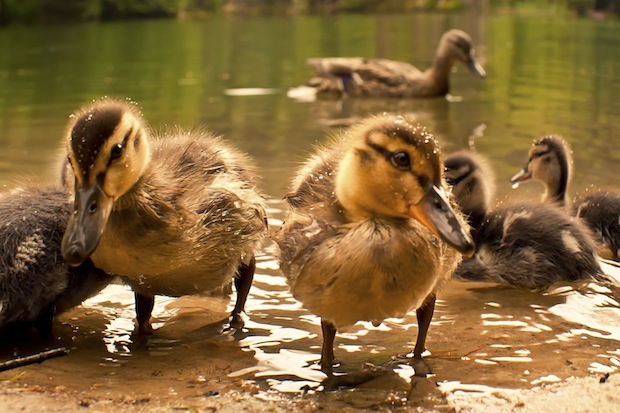There is at last good news to report on the poultry front. In the past, when I have mentioned my chickens or my ducks, it has usually been after some grisly tragedy — a duck decapitated by a terrier, another disembowelled by a fox. I can no longer remember how many chickens I have lost to foxes, which usually leave only piles of feathers as evidence of their visits (though I once saw a fox brazenly killing a chicken in broad daylight just outside my front door). But since I am determined never to yield to terrorism, I always head off to the poultry centre in Towcester to replace whatever bird has been killed with one looking as much like it as possible. I thus keep my poultry numbers roughly stable at around eight ducks and eight chickens at any one time.
Since a spate of fox attacks in the spring, the saddest thing that has happened to me is the loss in June of four tiny brown ducklings, the first offspring produced by any of my poultry. They were the progeny of my two call ducks, Boris and Marina, and they appeared out of nowhere to be seen for the first time bobbing about on my enormous pond. But within two days they had all gone, almost certainly picked off from the air by some predatory bird, probably a heron. I had earlier telephoned the poultry centre for advice on how to protect them and was told just to leave things to nature, Nature duly responded in its typically cruel way.
But just a couple of weeks ago a young man was strimming nettles on a bank near the pond and an Indian Runner Duck sitting on a nest, from which tiny squeaking noises emerged, was revealed. An investigation found that she had just given birth to eight ducklings. This time I was determined to deny nature its fun. I rang Geoff, the farmer next door, to ask him for help. He responded magnificently, arriving on his quad bike with an improvised run of wood and wire netting, which he set up on the lawn. He then captured the ducklings and their mother and put them all inside it, something I could never have achieved. As a result, the ducklings are all still alive and well and waiting for the moment when I will consider them big enough to take to the water without any risk of them being dive-bombed from the air. This could even be as soon as next week.
Meanwhile, there have been no casualties among my chickens for a long time now. I have still worried about them because the weather has been so warm that they haven’t been going into their hutches at night to perch, as they always used to do, but have been roosting low down outside, making themselves vulnerable to foxes. When the chickens went indoors of their own accord, all I had to do was to go out with a torch at night and shut them in. Now I must pick up each one individually and place it in a hutch, which is a much more difficult undertaking. Sometimes I don’t manage to complete the task, and one or two chickens get left outside. But so far they have all been there in the morning, which must mean that there are no foxes around at the moment.
Another odd thing about the chickens is that, while they used to go around in a gang, they now mainly go about in pairs, each with the partner most similar to herself. Thus, the two French Cuckoo Marans stick together, as do the two Italian Partridge Leghorns. Although one is black and the other is white, the same is true of the two Sussex hens, while the Columbian Blacktail and the Golden Speckled hens, though of different breeds, perhaps like each other best because they are of a similar reddish colour.
The least popular chickens in the flock are the most recent arrivals, the Italian pair, which are treated contemptuously by the others. This may be because they are seen as immigrants, sponging off the welfare provided by me; or because they are themselves rather aggressive and anti-social. My hope is to bring harmony to this divided multicultural flock. But I fear that before I achieve this there will be more losses, as winter is approaching and the foxes will be on the prowl again.
Got something to add? Join the discussion and comment below.
Get 10 issues for just $10
Subscribe to The Spectator Australia today for the next 10 magazine issues, plus full online access, for just $10.
You might disagree with half of it, but you’ll enjoy reading all of it. Try your first month for free, then just $2 a week for the remainder of your first year.













Comments
Don't miss out
Join the conversation with other Spectator Australia readers. Subscribe to leave a comment.
SUBSCRIBEAlready a subscriber? Log in